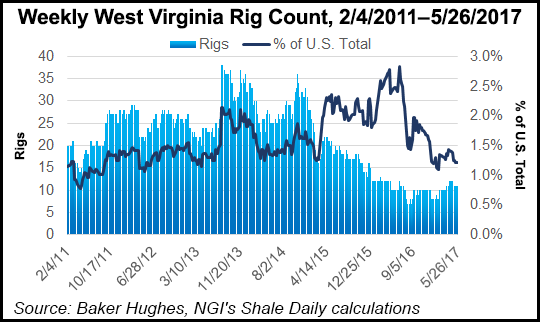Marcellus | E&P | NGI All News Access | NGI The Weekly Gas Market Report | Regulatory | Utica Shale
West Virginia Supreme Court Sides With Industry in Marcellus Pooling Case
The Supreme Court of Appeals of West Virginia has reversed a lower court ruling that approval by those holding oil and natural gas royalty rights is required for pooling agreements in the state’s Marcellus Shale.

“The pooling of nonparticipating royalty interests with the interests of other individuals or entities for the horizontal drilling and production of oil and gas from the Marcellus Shale formation does not create a joint or undivided property interest in the oil and gas underlying the tract pooled,” Justice Menis Ketchum wrote in an opinion issued Wednesday, Gastar Exploration v. Joyce Contraguerro et al. [No. 16-0429]. “The cross-conveyance theory resulting in such a joint or undivided property interest is rejected.
“Rather, pooling results in a consolidation of contractual and financial interests regarding the drilling and production of oil and gas from the combined parcels of land.”
The court also found that where a lessee designates tracts of land for pooling, consent or ratification by holders of nonparticipating royalty interests to the pooling is not required when they “have conveyed the oil and gas in place and the executive leasing rights…to the lessor.”
The case revolved around a 3,286-acre leasehold in Marshall County, WV. The lessor was PPG Industries; the lessee, Gastar Exploration USA, designated 700 acres of the property for pooling the oil and gas interests held by various individuals and entities.
In 2014 a group of nonparticipating royalty interest (NPRI) holders, which had not ratified the lease, sought a declaration of their rights and status regarding the lease and alleged that PPG should not have given Gastar authority to pool acreage without the NPRI holders’ consent.
The state’s highest court found that the circuit court erred “in ruling that the validity of the pooling provision and [Gastar’s] Wayne/Lily Unit was dependent upon the consent and ratification of the NPRI holders.”
West Virginia has struggled with pooling issues in recent years as activity in the Marcellus has burgeoned. It is one of only three producing states without a comprehensive pooling law. Proponents argue that forced pooling would enable producers to better block up their acreage positions for today’s far-reaching laterals, maximize production and reduce surface disruption.
The industry opted to push for co-tenancy and joint development this year instead of forced pooling legislation, which has failed repeatedly in recent years over property rights concerns.
The oil and natural gas industry’s ongoing attempt to get some kind of law passed in the state to gather landowners into large tracts for unconventional horizontal drilling will likely have to wait another year as the latest legislation recently stalled with little time left in the regular session. A similar bill failed just hours before the 2015 regular session ended.
© 2024 Natural Gas Intelligence. All rights reserved.
ISSN © 2577-9877 | ISSN © 1532-1266 | ISSN © 2158-8023 |
